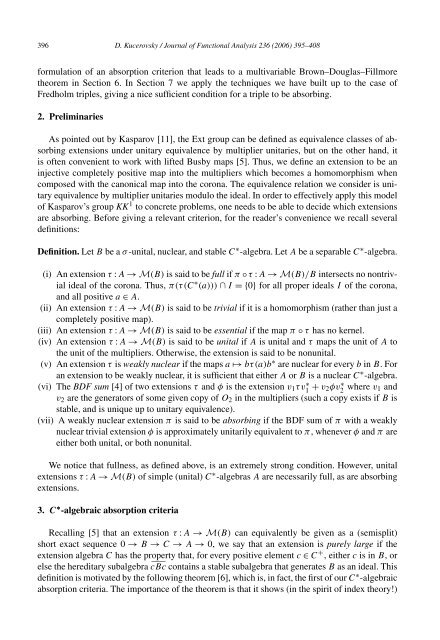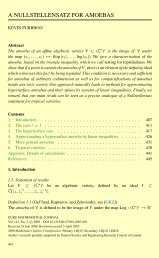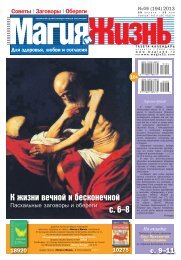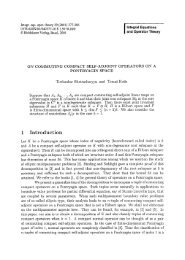Estimation optimale du gradient du semi-groupe de la chaleur sur le ...
Estimation optimale du gradient du semi-groupe de la chaleur sur le ...
Estimation optimale du gradient du semi-groupe de la chaleur sur le ...
You also want an ePaper? Increase the reach of your titles
YUMPU automatically turns print PDFs into web optimized ePapers that Google loves.
396 D. Kucerovsky / Journal of Functional Analysis 236 (2006) 395–408<br />
formu<strong>la</strong>tion of an absorption criterion that <strong>le</strong>ads to a multivariab<strong>le</strong> Brown–Doug<strong>la</strong>s–Fillmore<br />
theorem in Section 6. In Section 7 we apply the techniques we have built up to the case of<br />
Fredholm trip<strong>le</strong>s, giving a nice sufficient condition for a trip<strong>le</strong> to be absorbing.<br />
2. Preliminaries<br />
As pointed out by Kasparov [11], the Ext group can be <strong>de</strong>fined as equiva<strong>le</strong>nce c<strong>la</strong>sses of absorbing<br />
extensions un<strong>de</strong>r unitary equiva<strong>le</strong>nce by multiplier unitaries, but on the other hand, it<br />
is often convenient to work with lifted Busby maps [5]. Thus, we <strong>de</strong>fine an extension to be an<br />
injective comp<strong>le</strong>tely positive map into the multipliers which becomes a homomorphism when<br />
composed with the canonical map into the corona. The equiva<strong>le</strong>nce re<strong>la</strong>tion we consi<strong>de</strong>r is unitary<br />
equiva<strong>le</strong>nce by multiplier unitaries mo<strong>du</strong>lo the i<strong>de</strong>al. In or<strong>de</strong>r to effectively apply this mo<strong>de</strong>l<br />
of Kasparov’s group KK 1 to concrete prob<strong>le</strong>ms, one needs to be ab<strong>le</strong> to <strong>de</strong>ci<strong>de</strong> which extensions<br />
are absorbing. Before giving a re<strong>le</strong>vant criterion, for the rea<strong>de</strong>r’s convenience we recall several<br />
<strong>de</strong>finitions:<br />
Definition. Let B be a σ -unital, nuc<strong>le</strong>ar, and stab<strong>le</strong> C ∗ -algebra. Let A be a separab<strong>le</strong> C ∗ -algebra.<br />
(i) An extension τ : A → M(B) is said to be full if π ◦ τ : A → M(B)/B intersects no nontrivial<br />
i<strong>de</strong>al of the corona. Thus, π(τ(C ∗ (a))) ∩ I ={0} for all proper i<strong>de</strong>als I of the corona,<br />
and all positive a ∈ A.<br />
(ii) An extension τ : A → M(B) is said to be trivial if it is a homomorphism (rather than just a<br />
comp<strong>le</strong>tely positive map).<br />
(iii) An extension τ : A → M(B) is said to be essential if the map π ◦ τ has no kernel.<br />
(iv) An extension τ : A → M(B) is said to be unital if A is unital and τ maps the unit of A to<br />
the unit of the multipliers. Otherwise, the extension is said to be nonunital.<br />
(v) An extension τ is weakly nuc<strong>le</strong>ar if the maps a ↦→ bτ(a)b ∗ are nuc<strong>le</strong>ar for every b in B.For<br />
an extension to be weakly nuc<strong>le</strong>ar, it is sufficient that either A or B is a nuc<strong>le</strong>ar C ∗ -algebra.<br />
(vi) The BDF sum [4] of two extensions τ and φ is the extension v1τv ∗ 1 + v2φv ∗ 2 where v1 and<br />
v2 are the generators of some given copy of O2 in the multipliers (such a copy exists if B is<br />
stab<strong>le</strong>, and is unique up to unitary equiva<strong>le</strong>nce).<br />
(vii) A weakly nuc<strong>le</strong>ar extension π is said to be absorbing if the BDF sum of π with a weakly<br />
nuc<strong>le</strong>ar trivial extension φ is approximately unitarily equiva<strong>le</strong>nt to π, whenever φ and π are<br />
either both unital, or both nonunital.<br />
We notice that fullness, as <strong>de</strong>fined above, is an extremely strong condition. However, unital<br />
extensions τ : A → M(B) of simp<strong>le</strong> (unital) C ∗ -algebras A are necessarily full, as are absorbing<br />
extensions.<br />
3. C ∗ -algebraic absorption criteria<br />
Recalling [5] that an extension τ : A → M(B) can equiva<strong>le</strong>ntly be given as a (<strong>semi</strong>split)<br />
short exact sequence 0 → B → C → A → 0, we say that an extension is purely <strong>la</strong>rge if the<br />
extension algebra C has the property that, for every positive e<strong>le</strong>ment c ∈ C + , either c is in B, or<br />
else the hereditary subalgebra cBc contains a stab<strong>le</strong> subalgebra that generates B as an i<strong>de</strong>al. This<br />
<strong>de</strong>finition is motivated by the following theorem [6], which is, in fact, the first of our C ∗ -algebraic<br />
absorption criteria. The importance of the theorem is that it shows (in the spirit of in<strong>de</strong>x theory!)

















